| diagram | 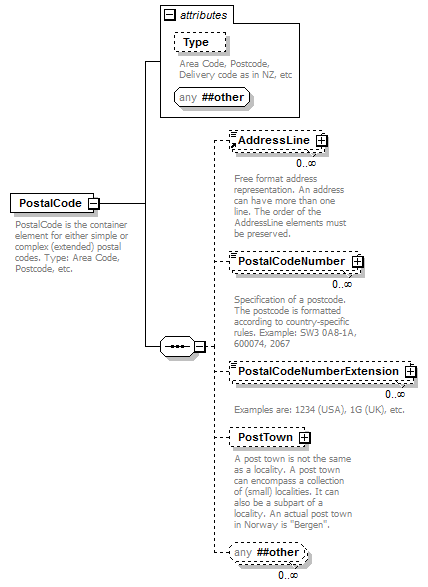 |
||||||||||||||
| namespace | urn:oasis:names:tc:ciq:xsdschema:xAL:2.0 | ||||||||||||||
| properties |
|
||||||||||||||
| children | AddressLine PostalCodeNumber PostalCodeNumberExtension PostTown | ||||||||||||||
| used by | |||||||||||||||
| attributes |
|
||||||||||||||
| annotation |
|
||||||||||||||
| source | <element name="PostalCode"> <annotation> <documentation>PostalCode is the container element for either simple or complex (extended) postal codes. Type: Area Code, Postcode, etc.</documentation> </annotation> <complexType> <sequence> <element ref="AddressLine" minOccurs="0" maxOccurs="unbounded"/> <element name="PostalCodeNumber" minOccurs="0" maxOccurs="unbounded"> <annotation> <documentation>Specification of a postcode. The postcode is formatted according to country-specific rules. Example: SW3 0A8-1A, 600074, 2067</documentation> </annotation> <complexType mixed="true"> <attribute name="Type"> <annotation> <documentation>Old Postal Code, new code, etc</documentation> </annotation> </attribute> <attributeGroup ref="grPostal"/> <anyAttribute namespace="##other"/> </complexType> </element> <element name="PostalCodeNumberExtension" minOccurs="0" maxOccurs="unbounded"> <annotation> <documentation>Examples are: 1234 (USA), 1G (UK), etc.</documentation> </annotation> <complexType mixed="true"> <attribute name="Type"> <annotation> <documentation>Delivery Point Suffix, New Postal Code, etc..</documentation> </annotation> </attribute> <attribute name="NumberExtensionSeparator"> <annotation> <documentation>The separator between postal code number and the extension. Eg. "-"</documentation> </annotation> </attribute> <attributeGroup ref="grPostal"/> <anyAttribute namespace="##other"/> </complexType> </element> <element name="PostTown" minOccurs="0"> <annotation> <documentation>A post town is not the same as a locality. A post town can encompass a collection of (small) localities. It can also be a subpart of a locality. An actual post town in Norway is "Bergen".</documentation> </annotation> <complexType> <sequence> <element ref="AddressLine" minOccurs="0" maxOccurs="unbounded"/> <element name="PostTownName" minOccurs="0" maxOccurs="unbounded"> <annotation> <documentation>Name of the post town</documentation> </annotation> <complexType mixed="true"> <attribute name="Type"/> <attributeGroup ref="grPostal"/> <anyAttribute namespace="##other"/> </complexType> </element> <element name="PostTownSuffix" minOccurs="0"> <annotation> <documentation>GENERAL PO in MIAMI GENERAL PO</documentation> </annotation> <complexType mixed="true"> <attributeGroup ref="grPostal"/> <anyAttribute namespace="##other"/> </complexType> </element> </sequence> <attribute name="Type"> <annotation> <documentation>eg. village, town, suburb, etc</documentation> </annotation> </attribute> <anyAttribute namespace="##other"/> </complexType> </element> <any namespace="##other" minOccurs="0" maxOccurs="unbounded"/> </sequence> <attribute name="Type"> <annotation> <documentation>Area Code, Postcode, Delivery code as in NZ, etc</documentation> </annotation> </attribute> <anyAttribute namespace="##other"/> </complexType> </element> |
attribute PostalCode/@Type
| annotation |
|
||
| source | <attribute name="Type"> <annotation> <documentation>Area Code, Postcode, Delivery code as in NZ, etc</documentation> </annotation> </attribute> |
element PostalCode/PostalCodeNumber
| diagram | 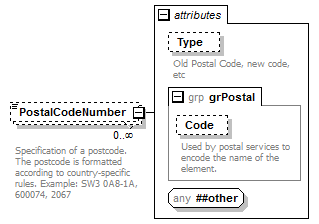 |
||||||||||||||||||||||
| namespace | urn:oasis:names:tc:ciq:xsdschema:xAL:2.0 | ||||||||||||||||||||||
| properties |
|
||||||||||||||||||||||
| attributes |
|
||||||||||||||||||||||
| annotation |
|
||||||||||||||||||||||
| source | <element name="PostalCodeNumber" minOccurs="0" maxOccurs="unbounded"> <annotation> <documentation>Specification of a postcode. The postcode is formatted according to country-specific rules. Example: SW3 0A8-1A, 600074, 2067</documentation> </annotation> <complexType mixed="true"> <attribute name="Type"> <annotation> <documentation>Old Postal Code, new code, etc</documentation> </annotation> </attribute> <attributeGroup ref="grPostal"/> <anyAttribute namespace="##other"/> </complexType> </element> |
attribute PostalCode/PostalCodeNumber/@Type
| annotation |
|
||
| source | <attribute name="Type"> <annotation> <documentation>Old Postal Code, new code, etc</documentation> </annotation> </attribute> |
element PostalCode/PostalCodeNumberExtension
| diagram | 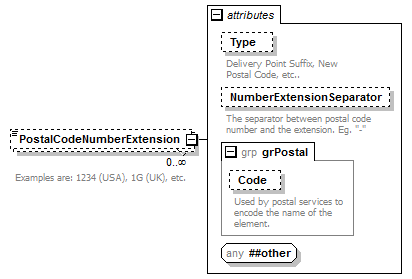 |
||||||||||||||||||||||||||||||
| namespace | urn:oasis:names:tc:ciq:xsdschema:xAL:2.0 | ||||||||||||||||||||||||||||||
| properties |
|
||||||||||||||||||||||||||||||
| attributes |
|
||||||||||||||||||||||||||||||
| annotation |
|
||||||||||||||||||||||||||||||
| source | <element name="PostalCodeNumberExtension" minOccurs="0" maxOccurs="unbounded"> <annotation> <documentation>Examples are: 1234 (USA), 1G (UK), etc.</documentation> </annotation> <complexType mixed="true"> <attribute name="Type"> <annotation> <documentation>Delivery Point Suffix, New Postal Code, etc..</documentation> </annotation> </attribute> <attribute name="NumberExtensionSeparator"> <annotation> <documentation>The separator between postal code number and the extension. Eg. "-"</documentation> </annotation> </attribute> <attributeGroup ref="grPostal"/> <anyAttribute namespace="##other"/> </complexType> </element> |
attribute PostalCode/PostalCodeNumberExtension/@Type
| annotation |
|
||
| source | <attribute name="Type"> <annotation> <documentation>Delivery Point Suffix, New Postal Code, etc..</documentation> </annotation> </attribute> |
attribute PostalCode/PostalCodeNumberExtension/@NumberExtensionSeparator
| annotation |
|
||
| source | <attribute name="NumberExtensionSeparator"> <annotation> <documentation>The separator between postal code number and the extension. Eg. "-"</documentation> </annotation> </attribute> |
element PostalCode/PostTown
| diagram | 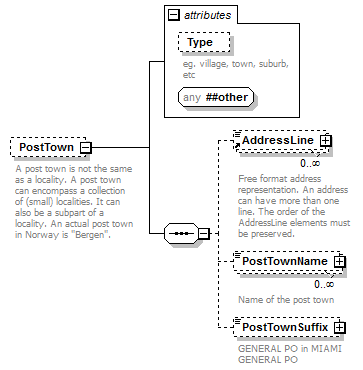 |
||||||||||||||
| namespace | urn:oasis:names:tc:ciq:xsdschema:xAL:2.0 | ||||||||||||||
| properties |
|
||||||||||||||
| children | AddressLine PostTownName PostTownSuffix | ||||||||||||||
| attributes |
|
||||||||||||||
| annotation |
|
||||||||||||||
| source | <element name="PostTown" minOccurs="0"> <annotation> <documentation>A post town is not the same as a locality. A post town can encompass a collection of (small) localities. It can also be a subpart of a locality. An actual post town in Norway is "Bergen".</documentation> </annotation> <complexType> <sequence> <element ref="AddressLine" minOccurs="0" maxOccurs="unbounded"/> <element name="PostTownName" minOccurs="0" maxOccurs="unbounded"> <annotation> <documentation>Name of the post town</documentation> </annotation> <complexType mixed="true"> <attribute name="Type"/> <attributeGroup ref="grPostal"/> <anyAttribute namespace="##other"/> </complexType> </element> <element name="PostTownSuffix" minOccurs="0"> <annotation> <documentation>GENERAL PO in MIAMI GENERAL PO</documentation> </annotation> <complexType mixed="true"> <attributeGroup ref="grPostal"/> <anyAttribute namespace="##other"/> </complexType> </element> </sequence> <attribute name="Type"> <annotation> <documentation>eg. village, town, suburb, etc</documentation> </annotation> </attribute> <anyAttribute namespace="##other"/> </complexType> </element> |
attribute PostalCode/PostTown/@Type
| annotation |
|
||
| source | <attribute name="Type"> <annotation> <documentation>eg. village, town, suburb, etc</documentation> </annotation> </attribute> |
element PostalCode/PostTown/PostTownName
| diagram | 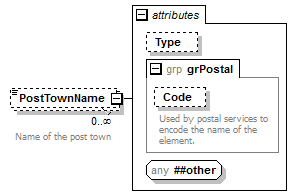 |
||||||||||||||||||||
| namespace | urn:oasis:names:tc:ciq:xsdschema:xAL:2.0 | ||||||||||||||||||||
| properties |
|
||||||||||||||||||||
| attributes |
|
||||||||||||||||||||
| annotation |
|
||||||||||||||||||||
| source | <element name="PostTownName" minOccurs="0" maxOccurs="unbounded"> <annotation> <documentation>Name of the post town</documentation> </annotation> <complexType mixed="true"> <attribute name="Type"/> <attributeGroup ref="grPostal"/> <anyAttribute namespace="##other"/> </complexType> </element> |
attribute PostalCode/PostTown/PostTownName/@Type
| source | <attribute name="Type"/> |
element PostalCode/PostTown/PostTownSuffix
| diagram | 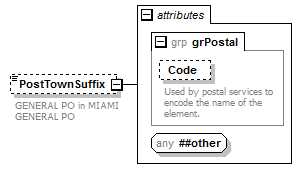 |
||||||||||||||
| namespace | urn:oasis:names:tc:ciq:xsdschema:xAL:2.0 | ||||||||||||||
| properties |
|
||||||||||||||
| attributes |
|
||||||||||||||
| annotation |
|
||||||||||||||
| source | <element name="PostTownSuffix" minOccurs="0"> <annotation> <documentation>GENERAL PO in MIAMI GENERAL PO</documentation> </annotation> <complexType mixed="true"> <attributeGroup ref="grPostal"/> <anyAttribute namespace="##other"/> </complexType> </element> |
XML Schema documentation generated by XMLSpy Schema Editor http://www.altova.com/xmlspy